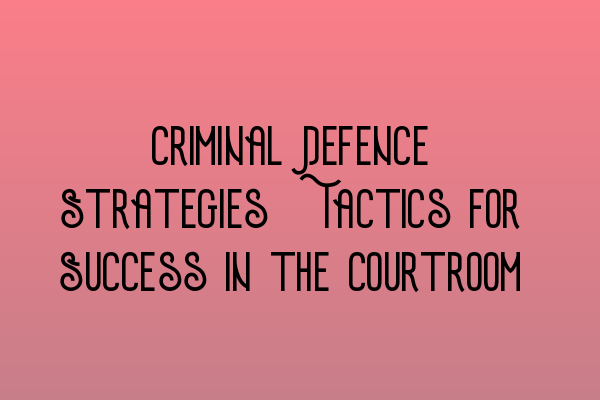Criminal Defence Strategies: Tactics for Success in the Courtroom
When facing criminal charges, it is crucial to have an effective defence strategy in place to increase the chances of success in the courtroom. Whether you are charged with a minor offence or a serious crime, proper legal representation and strategic planning can make all the difference in achieving a favorable outcome.
The Importance of Criminal Defence Strategies
A well-crafted defence strategy takes into account various factors, including the evidence, the credibility of witnesses, and the applicable laws. It aims to challenge the prosecution’s case and create reasonable doubt in the minds of the judge or jury.
With the help of an experienced criminal defence lawyer, you can develop a tailored strategy to protect your rights and build a strong case. The following are some essential tactics that can contribute to a successful defence:
1. Thorough Case Examination
An integral part of formulating a defence strategy is conducting a comprehensive examination of the case. This involves reviewing all the available evidence, witness statements, and police reports. By scrutinizing every detail, your defence lawyer can identify any weaknesses or inconsistencies in the prosecution’s case.
For instance, if there are contradictions in witness testimonies or procedural errors by law enforcement, your lawyer can use this to challenge the legitimacy of the prosecution’s evidence.
2. Expert Witness Testimonies
Expert witnesses can provide invaluable support to your defence strategy. These individuals are qualified in specific fields and can provide opinions or interpretations that may be favorable to your case.
For example, in a case involving forensic evidence, an experienced forensic expert can challenge the reliability of the prosecution’s findings. By presenting expert witnesses, you can strengthen your defence and provide alternative explanations or interpretations of the evidence presented.
3. Motion to Suppress Evidence
If the prosecution obtained evidence illegally or violated your constitutional rights during the investigation, your defence lawyer can file a motion to suppress that evidence. If successful, this can significantly weaken the prosecution’s case or even result in a dismissal of charges.
Understanding the nuances of search and seizure laws, interrogations, and other legal procedures is crucial for identifying potential violations and pursuing a motion to suppress.
4. Mitigating Factors and Alternative Charges
In some cases, it may be advantageous to pursue alternative charges or argue for reduced penalties based on mitigating factors. Mitigating factors can include your character, lack of criminal history, or extenuating circumstances surrounding the alleged offence.
By presenting a strong case for alternative charges or leniency, your defence lawyer can negotiate for a more favorable outcome, such as a reduced sentence or diversion programs.
5. Jury Selection and Persuasive Communication
If your case goes to trial, the selection of an impartial jury plays a pivotal role in the outcome. A skilled defence lawyer will employ effective voir dire techniques to select jurors who are open-minded and likely to empathize with your specific defence strategy.
Additionally, persuasive communication to both the judge and the jury throughout the trial is essential. This includes compelling opening statements, cross-examinations that expose weaknesses in the prosecution’s case, and compelling closing arguments that summarize key points in your defence.
By integrating these strategies into your defence plan, you can increase the likelihood of a successful outcome in the courtroom.
For professional legal representation and assistance in developing a strong defence strategy, contact SQE Criminal Law & Practice Law UK. Our team of experienced criminal defence lawyers can provide you with expert guidance and representation throughout the legal process.
Learn more about:
- SQE 1 Practice Exam Questions
- SQE 1 Practice Mocks FLK1 FLK2
- SQE 2 Preparation Courses
- SQE 1 Preparation Courses
- SRA SQE Exam Dates
